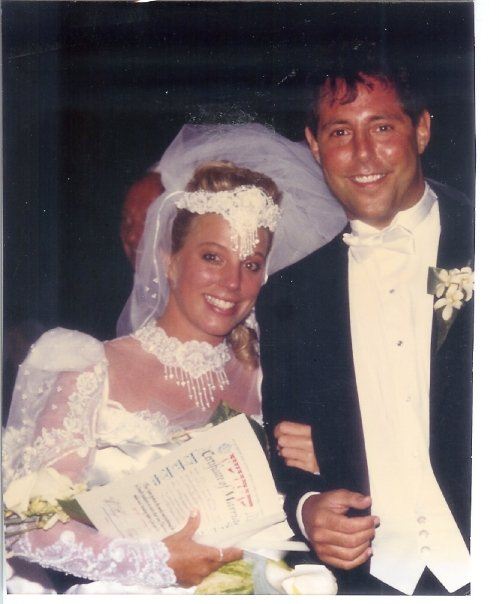Thirty-three years ago when Alan and I were newlyweds, the things that mattered were different than they are now.
We both wanted, make that needed, to be right in the beginning.
We had to have the last word, and we were extremely passionate in the heat of the moment. We weren’t fighting all that much, but when we did, there were no rules.
Alan came from a household that allowed for anyone who was upset to say whatever he or she wanted, with the understanding firmly in place, that everyone knew they were just blowing off steam. I came from a house where you didn’t say anything you didn’t mean because you couldn’t take it back once it was said, or undo the damage. “You have to remember that tea stains, so be careful where you spill it.”
In the early years of my marriage, if we had words, I would find myself in a mild panic that he was going to leave—which at the time didn’t seem all that far-fetched. Alan didn’t learn how to discuss feelings by example in his home. You had them, you hurled them at somebody, and then you hoped they went away. So when we found ourselves in a disturbance, he would get feverishly frustrated and storm out the door to cool off. This sent me into a tailspin as I was living out my biggest fear of being left alone mid emotional meltdown.
We were far less emotionally mature and far more dramatic in the early days. If someone was looking for two guinea pigs to teach how to fight fair, we were ripe for the picking. We needed to learn how to interact mid-firestorm. What’s most interesting to me is that over time, we learned that the two of us need some time before we sort it all out. Sometimes what comes from that is that we are two very different people from two very different backgrounds. It is not imperative that we agree on every detail of our lives together.
As a young couple, we believed we had to agree on most everything or something was wrong. This is not the case. There are core values that have to be in alignment and logistical details that have to work but it is entirely possible to disagree on certain issues and still live in harmony. This took us a while to figure out. And I don’t think we were alone in that. Over time, certain things mellow; the burning need to be right starts to smolder and the desire for peace overpowers the need for victory—or so it did for us.
As I grew up, I almost never felt safe or secure, even with loved ones. While I came off as having things totally together, my mind was often busy inventing reasons why people wouldn’t want to be my friend or why boyfriends wouldn’t want to take me home. As a result, one of my most tender triggers was being rejected or worse yet—abandoned.
I don’t need to read articles about my inner wounded child to know that she lives and breathes. It is for this reason that conflict in a relationship can send me right into fight-or-flight. I literally feel it in my gut.
When we met, I had a big job selling surgical implants in the operating room and Alan was a surgical resident working an average of 52 hours a shift, without sleep. We had about seven minutes a week to connect. We were building a life together, but there wasn’t all that much together. What could go wrong?
All these years later, conflict feels more like a normal part of life; we have developed skills through growing older and wiser. They are easily applied to our relationship and things just go smoothly most of the time. The mantra is no longer kill or be killed. We operate from a place of either working until we come up with a solution or wait for it, agreeing to disagree.
I often tell my yoga students that the only way to the other side is through. Most often I find this to be true. My desire would be to sit down and talk it through, but I am married to someone who needs to process and wants to protect the sanctity of our relationship. He knows when he gets hot he can say things he doesn’t mean; he comes by it honestly. So we have incorporated the element of time into our problem-solving. Our lives are busy so it is often an organic process.
Often we simply skip over searching for resolution if it’s a hot button we’re on, and agree to disagree. To some this may sound like we are not getting to the other side. On the contrary, conflict is often the result of one person’s trigger, and processing is not even the answer, just an unnecessary step.
We have taken enough workshops and done enough therapy to know that most of our issues came with us into the relationship. We have pledged to each other that when a disagreement unfolds, we will look inside and check ourselves. How much of what just happened was on me? When the dust has settled, we reconvene and debrief without overkill.
I have a habit of repeating my position. This is counterproductive and quite frankly, annoying. As a child, I never felt heard by my father, so that little girl that lives and breathes in me is doing her best to right the wrongs of my childhood where she exists.
The only way this process of resolution works is if there is a clear commitment to stay the course. After 33 years, you’d think that would be understood and yet, there are moments when I still feel that twinge of fear. I can’t remember the last time we got into a fight, but it is uncomfortable enough for both of us that we prefer to operate in a way that prevents most of them. I think about it like I do brushing my teeth so I don’t have to get a filling. It’s not avoiding something that is necessary, just choosing to do the work on the front end rather than the back end.
When you know you are each going to be there on the other side, revealing yourself doesn’t feel as much like you’re jumping off a cliff over shark-infested waters. The promise to be there functions as a safety net. When ground rules are in place that safeguard against injury, it is possible to state your case and walk away still friends. We genuinely try to see things from each other’s point of view and when it is clear that neither of us are folding, we do our best not to get stuck in the muck.
“A husband and wife may disagree on many things, but they must absolutely agree on this: to never, ever give up.” ~ Marriage.com
Alan used to be a great apologizer. Now I sometimes find myself spoon-feeding him the words, which to his credit, he is willing to repeat. He knows where he is lacking and receives the help with silent gratitude. For me, it still scratches the itch. He says what I need to hear and I hear what I need him to say. (Ignore the cue cards.)
There are times when I am not budging, and other times when he is simply not backing down. We know that is going to happen and when it does, we give each other some room to breathe. When we are at a true impasse, I am the more likely of the two of us to take the high road and say, “I’m sorry we’re here,” which is completely true. If I feel I may have had more of a hand in putting us into our current situation, I might offer up something like, “I’m sorry for my part in getting here,” and other times when I am not feeling so generous of spirit, I stand my ground.
“Aint no mountain high enough to keep me from you.”
The feeling of disconnectedness that comes with an argument has far more stress for me than doing my part to get over the hump. I don’t have the energy to give him the silent treatment like I used to on the rare occasion that things blew up. I won’t play games because I know they just prolong the inevitable. We will figure things out. We always have, and we always will. We rarely argue because we both speak freely and make a habit of addressing anything that gets swept under the rug, regularly. Relationships can get messy and tidying up regularly helps.
One of the most helpful things I have found in resolving conflict is to speak from a place of I. All sentences start with “I.”
This would change the face of political debates. It requires the person speaking to own their part, and to choose their words from a place of accountability. It tends not to further agitate an already heated situation.
Another helpful tool is to wait until things have cooled, and think about how things might have gone differently. When there is calm in the air, perhaps debrief with each other about how things got out of hand, or what might have worked better. That means I would offer up how I could have handled myself in a more effective way and he would suggest ways he could have been more levelheaded.
If nothing else, walk away with something new that you learned, so it was worthwhile.
Ground rules are critical in order to protect boundaries in a relationship. There is something very real about putting things in writing. It feels contractual. I highly recommend putting your heart on paper and I insist that when protecting the borders of your relationship, you respect each other. Speed limits keep the roads safe. When we observe them, we are operating a vehicle with a clear understanding of what is permitted and what is prohibited. Guidelines help create expectations for people. Certain violations get a warning and others will land you in a whole heap of trouble.
“It is not a character flaw if I don’t agree with you, and respecting my opinion does not take away from yours.” ~ Unknown
What lines in your relationship cannot be crossed without serious repercussions? What vulnerabilities are completely off-limits when angry? What action can be taken to prevent unnecessary escalation of emotions that further complicates upset? How might you help your partner manage, so whatever is going on can be reconciled without damage or destruction? How can you request some space without making your partner feel unfinished? How can you work on keeping your wits about you? How best to be respectful when expressing disappointment or anger so your point can be heard? What can you do to hold space for your partner when they are expressing their hurt? How can you own your part?
There are skills to be learned that make resolving conflict look like a conversation instead of a revolution. Having an emotional blowout requires repair, just as a tire does when it explodes. So monitor pressure levels and be mindful that care and handling of your relationship is in order. When you feel that something is amiss, check in with your partner. It keeps things running smoothly.
Drama is for the big screen. Fights are for the ring. The sooner you decide that you are on the same team, jumping hurdles becomes a hiccup rather than a seizure. The duration of your issue will shorten over time, and recovery will become quicker.
Be willing to take the high road, rather than waiting to see how he will play his hand. There is no place for ego in these situations.
The objective isn’t to be the winner, it’s to get to the other side. In a relationship, that’s a win.
~












Read 23 comments and reply